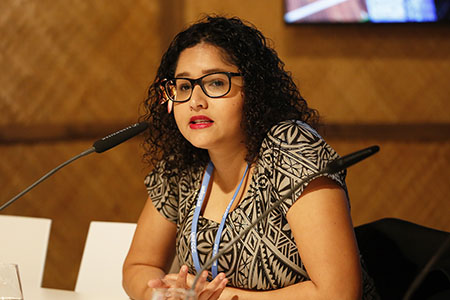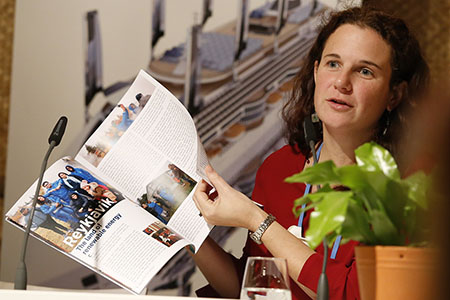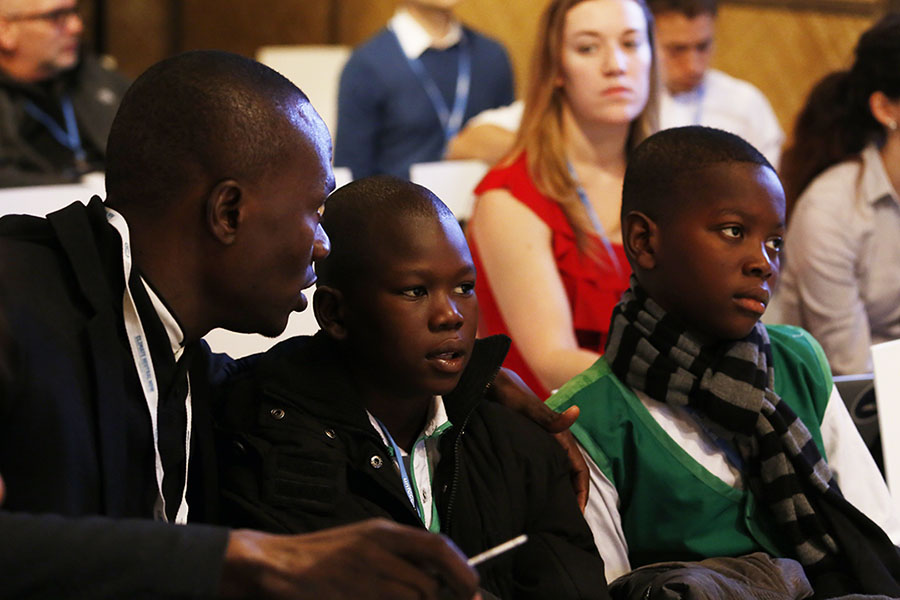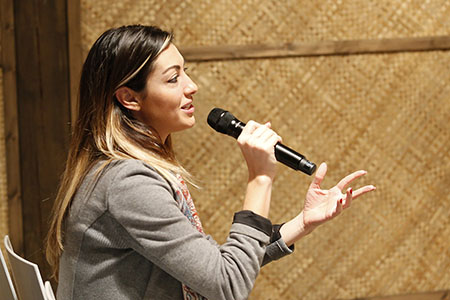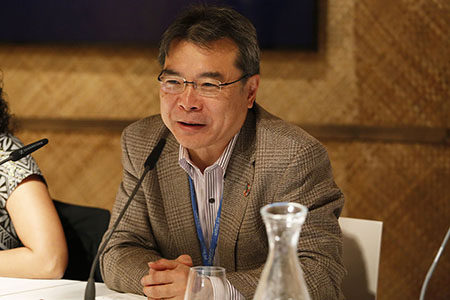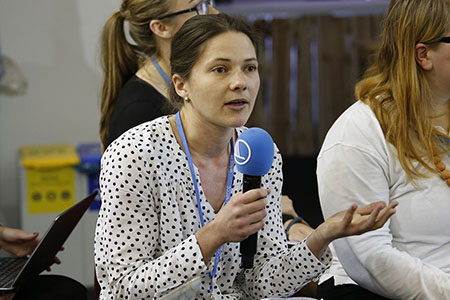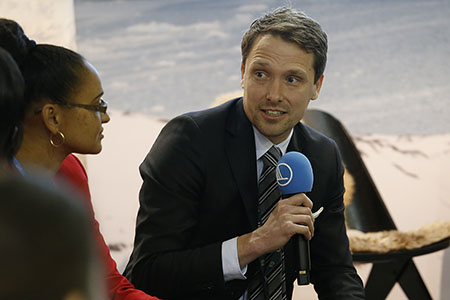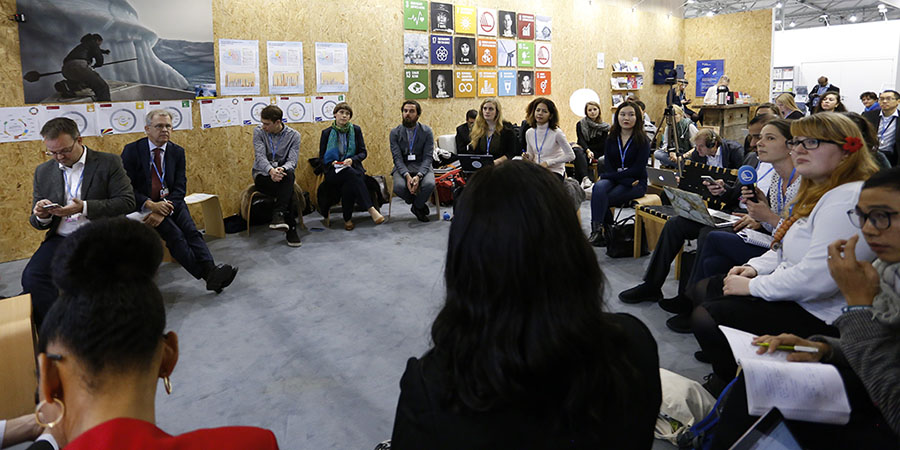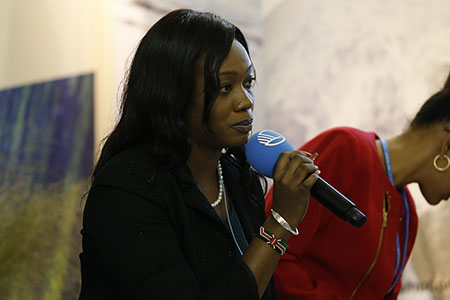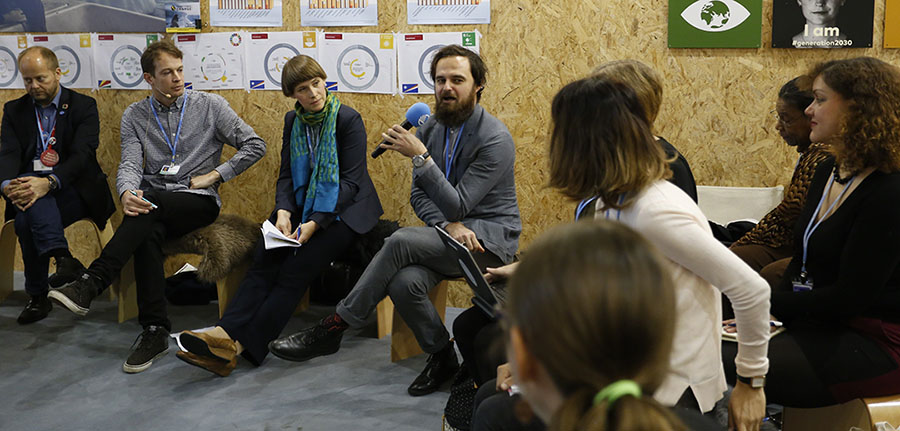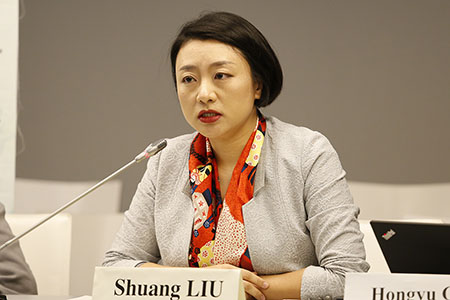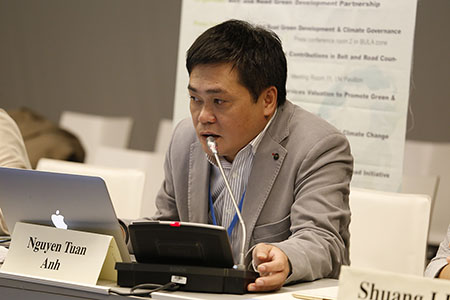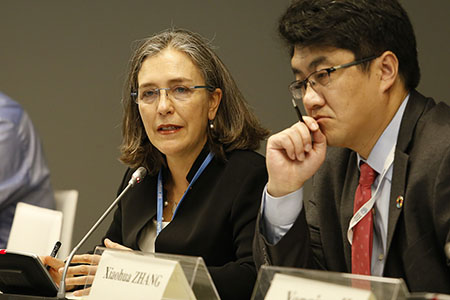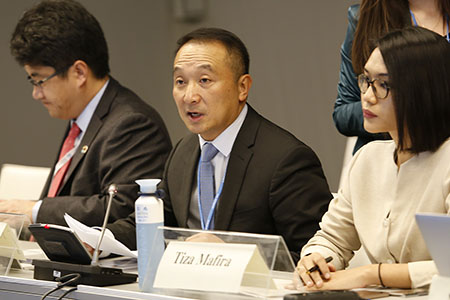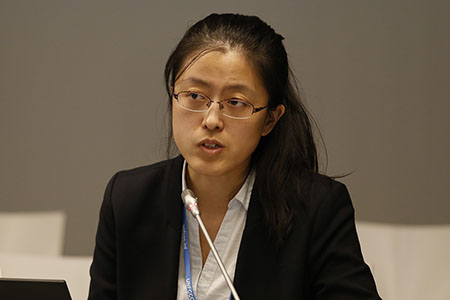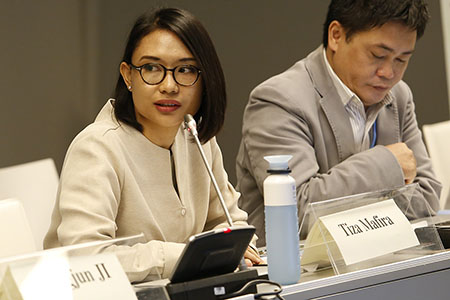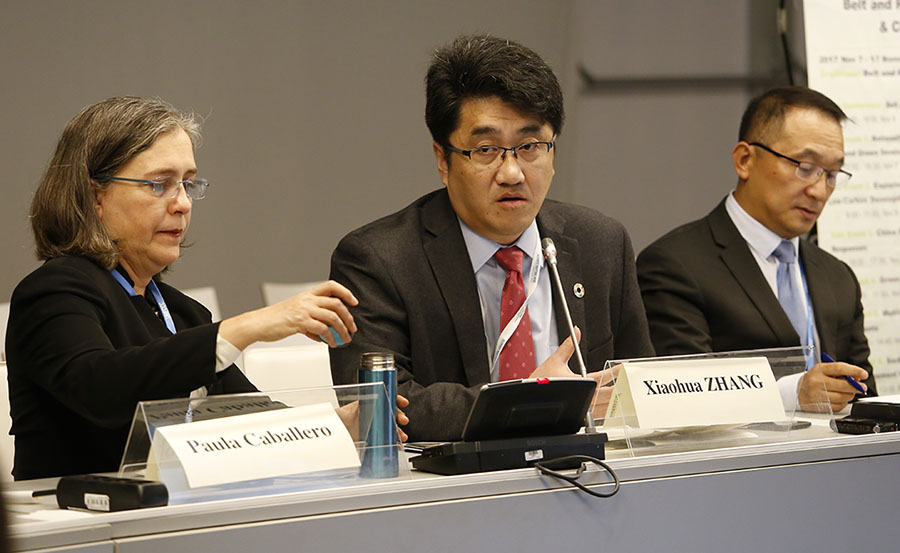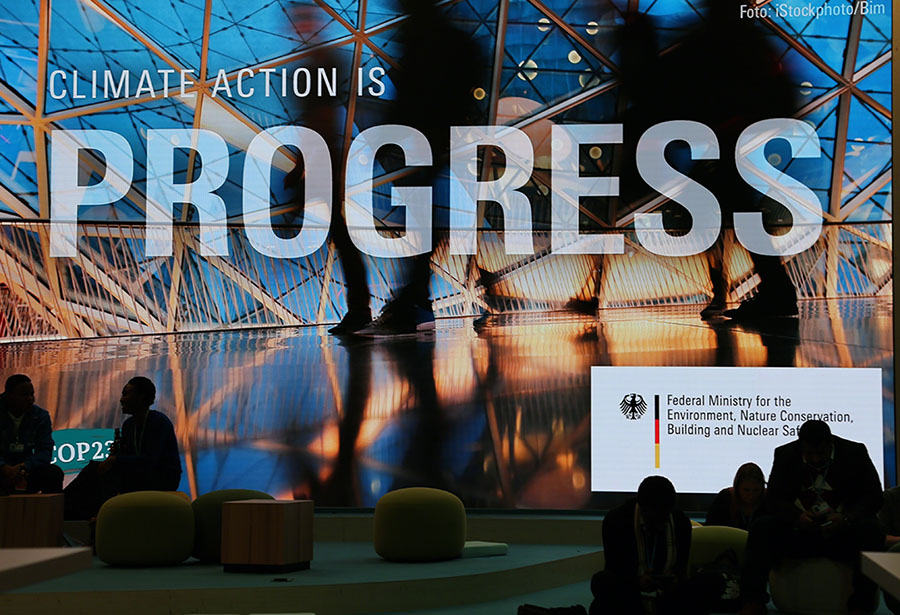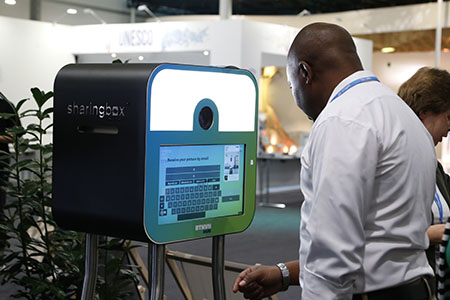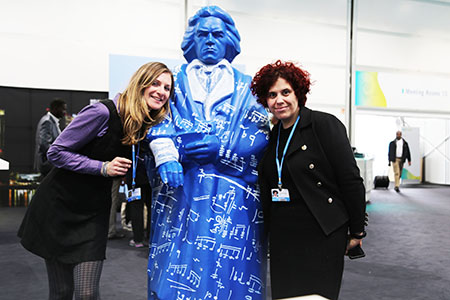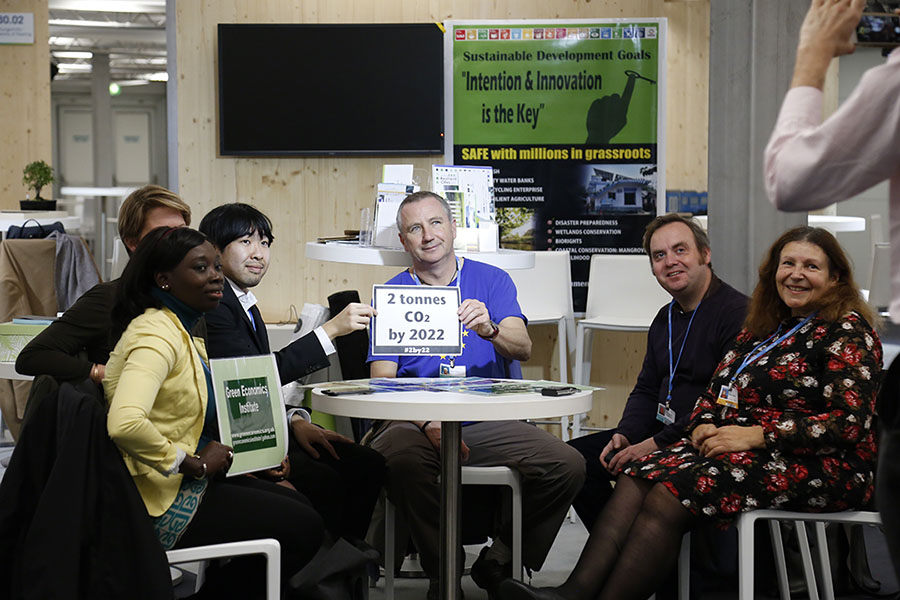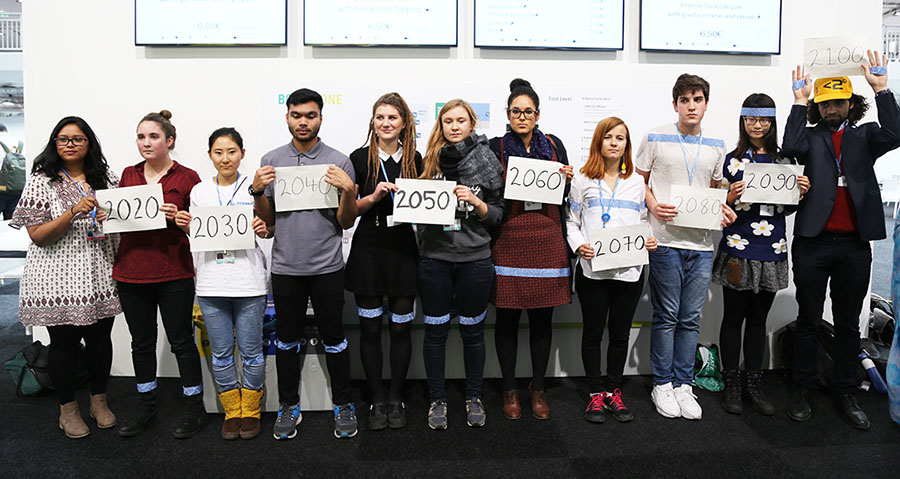Summary
The following events were covered by IISD Reporting Services on Friday, 17 November 2017:
- Global Talanoa for Climate Action
- Connections Between Climate Change, Agenda 2030 and National Development Priorities – Future Directions for the Small Island Developing States (SIDS)
- South-South Climate Cooperation to Drive Paris Agreement Implementation at National and Regional Levels
IISD Reporting Services, through its Earth Negotiations Bulletin on the Side (ENBOTS) Meeting Coverage, will provide daily web coverage from selected side events at the UN Climate Change Conference - November 2017.
Photos by IISD/ENB | Ángeles Estrada
For photo reprint permissions, please follow instructions at our Attribution Regulations for Meeting Photo Usage Page.
Global Talanoa for Climate Action
Presented by Peace Boat
This event, moderated by Karen Hallows, Peace Boat, focused on youth’s role in safeguarding oceans and promoting peace; the experiences of Peace Boat, a passenger ship sailing around the world to promote harmony and sustainability; and the Ecoship project, a ship under construction that will become operational by 2020 and will sail to raise awareness about climate change and the need to implement the Sustainable Development Goals (SDGs).
Yoshioka Tatsuya, Founder and Director, Peace Boat, recalled his youth as an activist and described his personal journey leading to the creation of Peace Boat, an organization promoting social and environmental connection focused on sustainable use of the ocean and human resilience. Giving details of Ecoship and ongoing Peace Boat voyages, he noted that both ships are “small floating villages” fostering community-building and solid friendships, which he said are both essential elements to spur international cooperation. Speaking on the urgency of protecting oceans, he emphasized the need to understand “in-the-field” effects of natural disasters, especially in small island developing states (SIDS), and stressed the need for imagination in overcoming the ongoing environmental crisis. He concluded by underscoring the need to “hear the voices” of those dependent on the ocean and traced a parallel with survivors of nuclear attacks.
Kya Lal, Peace Boat’s Youth Ambassador, Fiji, recalled individuals who suffered from the impacts of nuclear weapons, stating the similarities with the climate change crisis. She called for more platforms to share the experiences of vulnerable populations, and praised the opportunities that Ecoship brings to this endeavor. Lal described the background of key youth delegates who are part of the project, and noted the trajectory of her delegation’s journey to raise awareness of the urgency of action on ocean degradation and disaster risk prevention.
The event closed with the screening of “a journey for climate hope,” a documentary, soon to be distributed in schools and film festivals to promote peace, climate change awareness, and ocean preservation.
Kya Lal, Peace Boat’s Youth Ambassador, Fiji, noted that “oceans are borderless,” and thus require joint management.
Karen Hallows, Peace Boat, said that Ecoship can “put the voices of islanders out there in the world” and highlighted the role of oceans in climate mitigation.
Kids from Chad asks the panelists how they could engage with the project.
Nicole De Paula, Institute for Sustainable Development, Reporting Services, Brazil
Yoshioka Tatsuya, Founder and Director, Peace Boat, stated that Ecoship is “a floating sustainability laboratory and will sail for change.”
A shot of the documentary screened during the event.
Contact:
-
Yoshioka Tatsuya (Ecoship) | info@ecoship-pb.com
More Information:
Connections Between Climate Change, Agenda 2030 and National Development Priorities – Future Directions for the Small Island Developing States (SIDS)Presented by the Stockholm Environment Institute (SEI) and the German Development Institute (DIE)
This side event, hosted in the Nordic pavilion, explored interactions between Nationally Determined Contributions (NDCs) and SDGs, focusing on the extent to which NDCs are country-driven in a SIDS context. Magnus Benzie, SEI, moderated the discussion, which, in Nordic fashion, took place in an informal style with a high proportion of audience participation.
Adis Dzebo, SEI, during opening remarks, outlined the benefits of connecting the Paris Agreement and the 2030 Agenda for Sustainable Development, including: the necessity of climate action for human development; putting a human face to climate action; integrating synergies and mediating tradeoffs in implementation; and increasing financial efficiency by preventing duplication of efforts. He presented an analysis of the overlap between SIDS and their NDCs, as well as the 17 SDGs, highlighting, inter alia: that for SIDS, global partnerships are crucial to achieving both agendas; and that NDCs significantly underline the interlinked character of the SDGs, underscoring the need to actively incorporate trade-offs in policymaking processes.
Cleo Verkuijl, SEI, presented research on overlap between NDCs and countries’ national development plans (NDPs). She highlighted that NDC priorities tend to overlap with those in NDPs on a general or sectoral level, although there is less overlap on specific targets. She added that NDCs include some priorities, which are not in NDPs, and that many NDP priorities are not reflected in NDCs. She highlighted the potential for stronger linkages between NDPs and NDCs.
Sasha Gay Middleton, Antigua and Barbuda, outlining measures and actions taken in her country, emphasized, inter alia: the Environmental Protection and Management Act 2015, which is cross-sectoral in nature and addresses all SDGs and NDCs; her country’s accreditation to the Green Climate Fund, Global Environment Facility and the Adaptation Fund; and a national revolving loan programme. She stressed the importance of consultation with civil society organizations and the private sector to meet NDCs “without leaving anyone behind.” In response to a question from the floor, she said that the NDC formation process has involved stakeholders and stressed a bottom-up approach and horizontal linkages.
Bernd Hackmann, UNFCCC Secretariat, cautioned against “overestimating” the NDCs, saying that they are an entry point and serve a specific purpose, rather than showing everything that happens at national level. He emphasized the need to better connect the silos of the SDG and NDC processes, noting that they are both elements of countries’ development strategies. He further stressed that NDCs are political documents and, in response to a question about the future evolution of NDCs, he underlined ongoing discussions in the APA about the form and content of NDCs.
Hannah Janetscheck, DIE, affirming that NDCs should not be overestimated, highlighted that civil society and academia should work with governments to identify and develop pathways for dealing with trade-offs. She noted that silos have a value in terms of sector expertise and enforcing accountability, but these advantages are lost if no room for cross-linkages exists. She said a “master plan” for policy coherence between NDCs and SDGs is not needed, because, in reality, there will be a mixture of coordinated and uncoordinated approaches, but stressed that all approaches must be tied to local needs.
Topics raised in the discussion included: the close links between NDCs and SDG 17; barriers to accessing finance in SIDS; and ways in which ministries can work together on linking NDC and SDG processes. A participant from the Seychelles said her country, in planning its NDC, wanted to be realistic rather than overcommitting.
Lars Ronnås, Ambassador for Climate Change, Sweden, in closing remarks, said both the 2030 Agenda and the NDCs answer the question of how we want to organize our societies. He stressed the importance of: translating international documents into national policy issues; defending the multilateral system; linkages between the development and climate communities; and national consultations involving all stakeholders. He called for moving ahead with both mitigation and adaptation, stressing that “we need both.”
Cleo Verkuijl, SEI, noted the importance of country ownership in implementing both the climate and development agendas.
Bernd Hackmann, UNFCCC Secretariat, emphasized that NDCs are not an end in and of themselves.
Sasha Gay Middleton, Antigua and Barbuda, said “NDC commitments cannot be met without the people.”
Magnus Benzie, SEI, involved participants in discussion on the linkages between the SDGs and NDCs.
Adis Dzebo, SEI, cautioned against silos in implementing the 2030 Agenda and NDC commitments.
Contact:
-
Cleo Verkuijl (SEI) | cleo.verkuijl@sei-international.org
More Information:
South-South Climate Cooperation to Drive Paris Agreement Implementation at National and Regional Levels
Presented by Greenovation Hub, World Resources Institute (WRI), Rock Environment and Energy Institute, and Friends of Nature
In this side event, panelists explored the governance, financial, and technological demands of countries in implementing the Paris Agreement, including examples from Central, South-east, and South Asia. It was moderated by Paula Caballero, WRI.
Xiaohua Zhang, UN Office for South-South Cooperation (UNOSSC), explained that there are still gaps in implementing the Paris Agreement, and noted that south-south cooperation could be used to enhance collaboration. He added that many countries have included south-south cooperation in their Nationally Determined Contributions (NDCs), and called on parties to explore measurement, reporting and verification within cooperation. He highlighted challenges, including under-developed institutions within developing countries, which restricts the ability to unite resources and demand.
Yongjun Ji, Chinese People’s Association for Friendship with Foreign Countries (CPAFFC), noted that China will provide a substantial financial contribution for south-south cooperation. He explained that climate action has changed from top-down to bottom-up following COP 21, and called on parties to support all sectors in this regard. He added that NGOs are part of global climate governance, and said that CPAFFC will set up an ecological and environmental task force to encourage other members from civil society to participate actively in climate governance.
Tiza Mafira, Climate Policy Initiative (CPI), explained that from 2015-2016, 75% of climate finance was raised and spent domestically, but US$48 billion flowed from north to south, with US$9 billion flowing south to south. She highlighted Indonesia’s long history of south-south cooperation since 1955, and added that it now has a policy to scale up, focusing on new, innovative, and inclusive partnerships, including financial institutions.
Nguyen Tuan Anh, Viet Nam, outlined private sector investment in energy efficiency and renewable energy in his country, which includes roughly US$100-300 million per sector in the former, and US$9.7 billion over the last five years in the latter. He highlighted obstacles to energy efficiency and renewable energy, including, inter alia, enterprises opting out for low-investment choices, investors’ concern with operational risks, and difficulty in obtaining licenses.
Shuang Liu, Energy Foundation China (EFC), highlighted the mission of her organization to help China achieve a sustainable financial future. She called for tools to make climate and environmental concerns more relevant to banks. Regarding the public sector, she called for a universal definition of green projects in China, which thus far has not been possible due to institutional barriers. She urged improving framing of best practices to share with decision-makers in her country, in order to achieve consensus on climate-friendly south-south cooperation.
Hongyu Guo, Greenovation Hub, called for a paradigm shift in development to meet the increasing demand for resources and infrastructure. She highlighted China’s crucial role in development and climate change, including South-South Cooperation and the Belt and Road Green Development Initiative and spoke specifically about investment in Viet Nam. She explained that both cooperation and the Belt and Road Initiative should be strategic and practical.
During the ensuing discussion, participants addressed, among others: how South-South cooperation can change mindsets to deliver long-term solutions to development; cooperation within Latin America; the role of agriculture in South-South cooperation; and land use in climate change.
Shuang Liu, EFC, called for more feasible and implementable tools for banks when investing in climate change.
Nguyen Tuan Anh, Viet Nam, said that South-South cooperation has a “big future” in his country
Paula Caballero, WRI, asked “how can we help countries identify their needs?”
Yongjun Ji, CPAFFC, said that “South-South cooperation is for everybody around the world.”
L–R: Paula Caballero, WRI; Xiaohua Zhang, UNOSSC; Yongjun Ji, CPAFFC; Tiza Mafira, CPI; Nguyen Tuan Anh, Viet Nam; Shuang Liu, EFC; and Hongyu Guo, Greenovation Hub
Hongyu Guo, Greenovation Hub, said that China plays an important role in achieving the Sustainable Development Goals and the Paris Agreement.
Tiza Mafira, CPI, called on countries to articulate their intention to strengthen South-South cooperation on climate action.
Xiaohua Zhang, UNOSSC, said “we need to learn from each other in order to scale up activities.”
Contact:
-
Li Xiulan (Centre for Global Green Leadership) | xiulan@ghub.org
More Information:
Around the Venue

